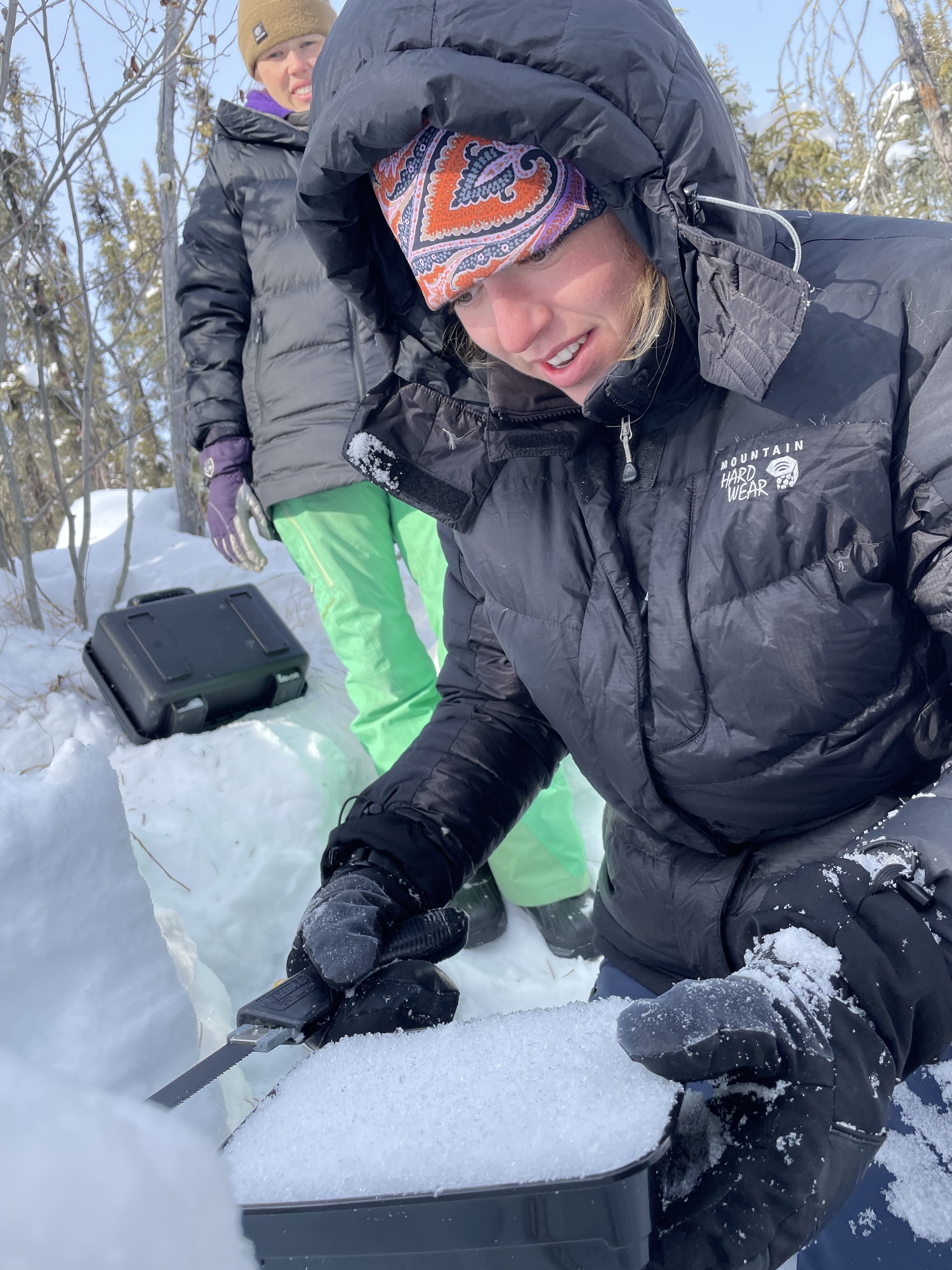Dozens descend upon Alaska to measure snow
Ned Rozell
907-474-7488
March 16, 2023

Hannah Wittman of the Cold Regions Research and Engineering Laboratory in Hanover, New Hampshire, gathers a snow sample from a forest near Fairbanks on March 15, 2023, as part of a NASA experiment called SnowEx. Kaitlin Meyer of Ohio State University looks on.
Five scientists have padded their way on snowshoes into the middle of this frozen swamp in Fairbanks. They are here to measure the pillowy, perfect snowpack that has fallen here, flake by flake, since last October.
Not far away, a dog musher yells “gee” to urge her lead dogs right on a fork of one of the winter trails through the refuge. As the researchers work under the sunshine in the 6-degree F air, a red squirrel rattles and chickadees sing. Spring at last.
You would not expect to meet a NASA scientist working on a multi-million-dollar experiment in this quiet patch of boreal forest, but Carrie Vuyovich is here. She wears a NASA knit cap, white bunny boots and snowshoes as she drags a long Siglin sled over a crooked snowshoe path.
Vuyovich is helping dig precision craters to measure characteristics of snow that determine how much of it will turn into water when it melts. That is why Vuyovich and more than three dozen other researchers are now pressing handsaws into snow on the ground and flying above the great white sheet in northern Alaska.
“It’s a natural reservoir,” Vuyovich said of the snow that suspended her a few feet above the ground at Creamer’s. “It’s a source of drinking water and hydropower. It’s important to ecosystems and wildlife and for recreation, and it covers as much as 30 percent of the land surface (of the world). It’s important to know how much is there.”
In a 2017 paper, snow scientist Matthew Sturm of UAF’s Geophysical Institute noted that about one-sixth of the world’s population relies on snowmelt for agriculture and human consumption. In California, most people rely on snow from the Sierra Nevada mountains for drinking and for the electricity that powers their phones and microwaves. The same mountain source — out of sight of most Californians — sustains the state’s agriculture, a $47 billion industry that feeds many of us.
“The valuation across many years of western U.S. snow resources exceeds a trillion dollars,” Sturm wrote.
NASA’s ultimate goal is to be able to know the amount of water in any given snowpack worldwide using satellites, Vuyovich said.

On March 15, 2023, Carrie Vuyovich of NASA Goddard Space Flight Center in Maryland drags a sled through the boreal forest north of Fairbanks as she moves equipment to measure the snowpack.
Right now, instruments on satellites are excellent at showing snow coverage over the Rocky Mountains, for example, “but it doesn’t tell us how much water-equivalent is there,” Vuyovich said.
“We would like to be able to map the water-equivalent (in snow) globally.”
Vuyovich and her partners who were knee-deep in snow at Deadhorse, Toolik Field Station and a few sites around Fairbanks in March were ground-truthing the snow characteristics gathered by pilots — including Chris Larsen of the Geophysical Institute — who flew swaths overhead with sophisticated instruments in the bellies of their planes.
A few hundred miles north of Vuyovich’s group in Fairbanks, Sveta Stuefer was on the same days scraping walls of snow with her trowel and looking at grains through a magnifying glass.
Stuefer, of UAF’s Water and Environmental Research Center, worked in typical North Slope spring conditions of minus 22 F air temperatures with a moderate wind “strong enough to move snow.” Her crew was — like Vuyovich’s — also digging snow pits beneath paths flown by instrumented planes.
In each of her pits, Stuefer had encountered a thick ice crust.
“They had a pouring rain (here) for 24 hours in December,” Stuefer said by phone from Toolik Research Station. “The snowpack looks so different. I keep asking myself if that’s our new normal.”

HP Marshall of Boise State University takes a photo of Alaska's North Slope north of the Brooks Range during a snow survey as part of a NASA experiment.
Vuyovich and her colleagues did not find the same in the powdery snow around Fairbanks.
“It’s a good snowpack,” she said. “It’s cold, no melting yet, and there’s no liquid water. We wanted it to be cold and dry and we have that.”
Vuyovich will soon return home to Maryland, the base of her employer NASA Goddard Space Flight Center.
There, away from the white Alaska world of the cryosphere, she will compare her teams’ numbers of northern Alaska snow with the airborne measurements. Combined with results from similar campaigns in Montana prairie and Colorado mountains, she will help NASA inch closer to quantifying the water held each winter by the world’s snow from instruments looping hundreds of miles over our heads.
Since the late 1970s, the University of Alaska Fairbanks' Geophysical Institute has provided this column free in cooperation with the UAF research community. Ned Rozell ned.rozell@alaska.edu is a science writer for the Geophysical Institute.


